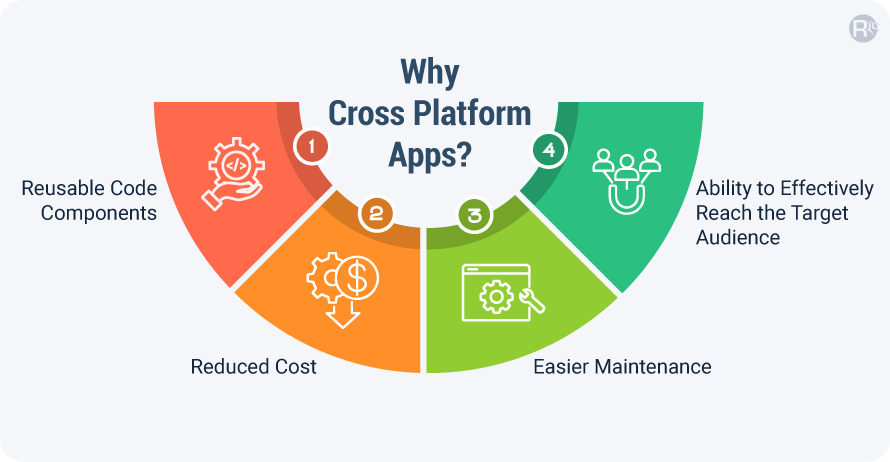In today's world, there are numerous platforms across various devices, each with its unique way of operating. For instance, in the realm of mobile phones, we have operating systems like iOS, Android, Windows, and BlackBerry. This extends to tablets, laptops, and personal computers, where even more operating systems are found, including Linux, Ubuntu, OS X, Windows, and more. Cross-platform software that is compatible with these systems is offered in two forms. First, the development of a separate software for each specific platform, and second, development that runs on multiple platforms without the need for any modifications.
Let's take a closer look at the power of cross-platform mobile applications:
Usually, forming a cross-platform app allows specialists to create a program that uses a programming language for coding. This enhances efficiency and enables the development of a high-quality app that works on any platform.
|
Choosing the right mobile app development platform |
Advantages of cross-platform apps
From startups to large organizations, cross-platform apps offer numerous benefits:
Let's take a closer look at the power of cross-platform mobile applications:
Usually, forming a cross-platform app allows specialists to create a program that uses a programming language for coding. This enhances efficiency and enables the development of a high-quality app that works on any platform.
Some advantages of cross-platform apps:
-
Easy Repairs, Maintenance, and Deployment: These apps eliminate the need for extra work during development and can easily be maintained across multiple platforms, including iOS, Android, and others. Any necessary changes can be made by the app developer in a matter of minutes, without the need to access each platform separately. Additionally, if a database issue is discovered, it can be fixed on one platform and removed from all locations.
-
Unified Codebase: Since all platforms are integrated with the same code, these apps reduce the labor of placing the same code on every device, allowing app developers to focus on design and functionality. This less risky approach significantly reduces the burden of monitoring each platform separately.
-
Cost-Effective: When it comes to advancing a business to the next level, business owners want to utilize all available digital platforms to reach the maximum number of target consumers. Developing this type of cross-platform app is less expensive because coding is easier and faster. Furthermore, the money saved by using a cross-platform app can be invested in marketing initiatives.
-
Easy Development: Cross-platform app development has come a long way thanks to the simplicity of creating native-like apps and improved codes and platforms. This is a win-win situation for both the development team and the company, as the company wants faster results in less time.
-
A Wide Range of Development Tools: Various development tools are available to facilitate the process, offering a standard design and improved user interface features that directly benefit businesses.
-
Easy Updates: As previously mentioned, various solutions are available to enhance the user experience, and one of the most critical indicators of a program's speed and usability is its ability to be quickly updated. These tools simplify code translation, and the app may automatically update itself via the internet.

Challenges of Cross-Platform Development:
While cross-platform app development offers many exciting advantages, just like any platform or software, it has its disadvantages. Some of the challenges of cross-platform development include:
Platform Switching
Most cross-platform frameworks use JavaScript, which can create challenges when reusing code. Therefore, finding an issue within the sea of code becomes confusing, ultimately increasing the time and cost of mobile app development.
Integration Process
Another common issue that arises when using cross-platform is increased time consumption. The integration process with local settings can be lengthy.
Limited Updates
Sometimes, the operating system may not support all the features used by a framework. For example, when iOS introduces a new update or feature, you must update your iOS version of the app accordingly. However, you can't do the same for Android until Google releases a similar update.
Slow Coding
Using cross-platform app development is not as easy as it may seem, especially for novice developers. Consequently, developers rely on cross-compatibility throughout the development process, resulting in slower code and seemingly sluggish app performance.
In summary, cross-platform development is a revolutionary technology that allows small and medium-sized businesses to expand their reach using a single application, increasing access while saving time and money. However, there are challenges in using this platform, so it's essential to compare the challenges with the opportunities before choosing the app development process.
At the end
As we all know, some mobile apps can be highly disruptive, and no one wants to lose their online presence in app stores. Sometimes, businesses find that if they go for native apps, budgeting can become problematic. That's why cross-platform app development has emerged as a competitive choice for businesses aiming for both Android and iOS presence today.


